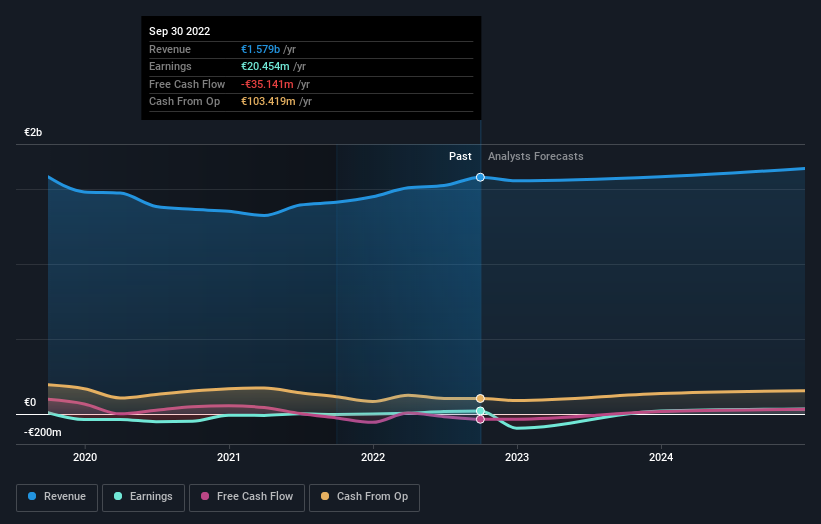- Germany
- /
- Construction
- /
- XTRA:B5A
Individual investors among BAUER Aktiengesellschaft's (ETR:B5A) largest stockholders and were hit after last week's 11% price drop

Key Insights
- Significant control over BAUER by general public implies that this group likely has considerable sway over management and governance-related decisions
- The top 2 shareholders own 62% of the company
- Insiders own 32% of BAUER
To get a sense of who is truly in control of BAUER Aktiengesellschaft (ETR:B5A), it is important to understand the ownership structure of the business. We can see that individual investors own the lion's share in the company with 33% ownership. In other words, the group stands to gain the most (or lose the most) from their investment into the company.
While the holdings of individual investors took a hit after last week’s 11% price drop, insiders with their 32% also suffered.
Let's take a closer look to see what the different types of shareholders can tell us about BAUER.
View our latest analysis for BAUER

What Does The Institutional Ownership Tell Us About BAUER?
Many institutions measure their performance against an index that approximates the local market. So they usually pay more attention to companies that are included in major indices.
BAUER already has institutions on the share registry. Indeed, they own a respectable stake in the company. This can indicate that the company has a certain degree of credibility in the investment community. However, it is best to be wary of relying on the supposed validation that comes with institutional investors. They too, get it wrong sometimes. When multiple institutions own a stock, there's always a risk that they are in a 'crowded trade'. When such a trade goes wrong, multiple parties may compete to sell stock fast. This risk is higher in a company without a history of growth. You can see BAUER's historic earnings and revenue below, but keep in mind there's always more to the story.

Hedge funds don't have many shares in BAUER. Thomas Bauer is currently the largest shareholder, with 32% of shares outstanding. Meanwhile, the second and third largest shareholders, hold 30% and 3.0%, of the shares outstanding, respectively.
After doing some more digging, we found that the top 2 shareholders collectively control more than half of the company's shares, implying that they have considerable power to influence the company's decisions.
Researching institutional ownership is a good way to gauge and filter a stock's expected performance. The same can be achieved by studying analyst sentiments. Quite a few analysts cover the stock, so you could look into forecast growth quite easily.
Insider Ownership Of BAUER
While the precise definition of an insider can be subjective, almost everyone considers board members to be insiders. Company management run the business, but the CEO will answer to the board, even if he or she is a member of it.
I generally consider insider ownership to be a good thing. However, on some occasions it makes it more difficult for other shareholders to hold the board accountable for decisions.
It seems insiders own a significant proportion of BAUER Aktiengesellschaft. Insiders have a €51m stake in this €160m business. We would say this shows alignment with shareholders, but it is worth noting that the company is still quite small; some insiders may have founded the business. You can click here to see if those insiders have been buying or selling.
General Public Ownership
The general public, who are usually individual investors, hold a 33% stake in BAUER. While this group can't necessarily call the shots, it can certainly have a real influence on how the company is run.
Private Company Ownership
We can see that Private Companies own 30%, of the shares on issue. Private companies may be related parties. Sometimes insiders have an interest in a public company through a holding in a private company, rather than in their own capacity as an individual. While it's hard to draw any broad stroke conclusions, it is worth noting as an area for further research.
Next Steps:
It's always worth thinking about the different groups who own shares in a company. But to understand BAUER better, we need to consider many other factors. Consider risks, for instance. Every company has them, and we've spotted 1 warning sign for BAUER you should know about.
Ultimately the future is most important. You can access this free report on analyst forecasts for the company.
NB: Figures in this article are calculated using data from the last twelve months, which refer to the 12-month period ending on the last date of the month the financial statement is dated. This may not be consistent with full year annual report figures.
Valuation is complex, but we're here to simplify it.
Discover if BAUER might be undervalued or overvalued with our detailed analysis, featuring fair value estimates, potential risks, dividends, insider trades, and its financial condition.
Access Free AnalysisHave feedback on this article? Concerned about the content? Get in touch with us directly. Alternatively, email editorial-team (at) simplywallst.com.
This article by Simply Wall St is general in nature. We provide commentary based on historical data and analyst forecasts only using an unbiased methodology and our articles are not intended to be financial advice. It does not constitute a recommendation to buy or sell any stock, and does not take account of your objectives, or your financial situation. We aim to bring you long-term focused analysis driven by fundamental data. Note that our analysis may not factor in the latest price-sensitive company announcements or qualitative material. Simply Wall St has no position in any stocks mentioned.
About XTRA:B5A
BAUER
Provides services, equipment, and products related to ground and groundwater in Germany, Europe, the Middle East, the Asia Pacific, Africa, and the Americas.
Undervalued with moderate growth potential.
Similar Companies
Market Insights
Community Narratives




